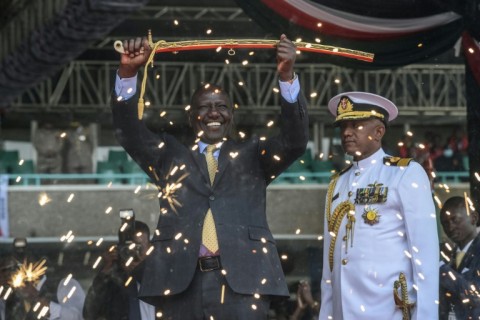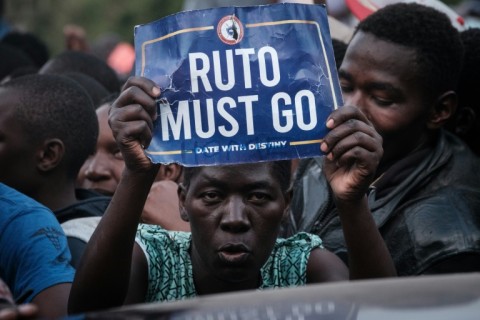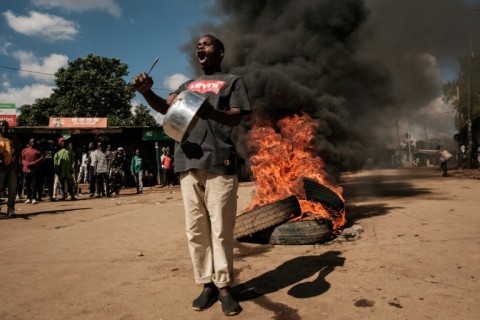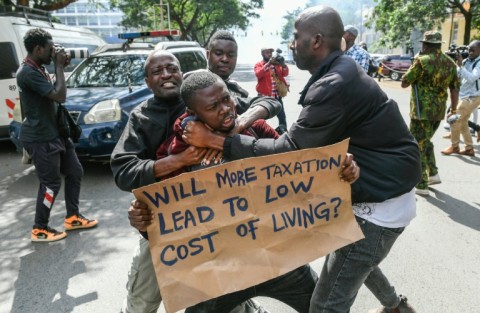NAIROBI - The shelves are stocked at Anita Wairimu's store in downtown Nairobi, but nothing is selling. Nobody has cash to spare, she explained, her customers are struggling just to make ends meet.
"I've had the shop for eight years. This has been the most difficult year. It's worse than during the Covid period," the 44-year-old single mother told AFP.
Wairimu pins her woes on the man she enthusiastically voted for president -- William Ruto, who took office a year ago promising to revive an economy in the doldrums and deliver prosperity to Kenya's hard-working "hustlers".
Ruto narrowly won the August 2022 election on a campaign offering a "bottom-up" economic plan to put more in the pockets of small traders, informal workers, and others living hand to mouth.
But instead, he imposed new taxes, and prices for ordinary Kenyans have exploded.

Inflation fell to 6.7 percent in August but over the past year petrol prices have increased 22 percent, electricity by nearly 50 percent, and household staples like sugar and beans by 61 percent and 30 percent respectively.
The commercial heart of East Africa, Kenya was not spared the fallout of the Covid-19 pandemic and war in Ukraine that brought pain to economies around the globe, and its recovery was hindered too by a record-breaking drought.
"The economy is bad everywhere in the world, it's global," said Simon Migwi, a 40-year-old motorcycle taxi driver willing to give Ruto some rope.
- 'Disappointed' -
But some problems are self-inflicted, analysts said, a belief that has taken hold even among some Ruto supporters.

"I was so happy when he was sworn in... now I am very disappointed," Wairimu told AFP, saying her daily earnings of roughly 1,000 Kenyan shillings ($6.8) had halved since Ruto took office.
"It's us, the hustlers, who are suffering most."
Kenya's economy is saddled with $69 billion in debt and the shilling has lost 30 percent of its value against the dollar in 18 months.
These factors have dragged on growth, which is forecast in 2023 to be lower than the 4.8 percent recorded last year.
Ken Gichinga, chief economist at analysis firm Mentoria Economics, described Ruto's first year as "an extremely challenging period".
"Number one, the global environment is not easy. And number two, the policies put in place have not been effective."

Ruto's "hustler fund", a flagship policy offering small loans to help cash-strapped Kenyans start businesses and stimulate the economy, had also not worked as intended, he said.
The introduction of a raft of new taxes -- particularly the doubling of VAT on fuel -- eroded purchasing power further.
The government said the pain was necessary to clean up a mess left by the previous administration -- one in which Ruto served as deputy president for a decade.
The tax hikes and cuts to fuel and food subsidies were broadly welcomed by the International Monetary Fund and World Bank, which extended loans in response.
- 'Betrayed' -
But on the streets, the reception has been cold.
"They lied to the hustlers, they conned the hustlers," said Robert Kiberenge, a 47-year-old long-term unemployed man.

He voted for Raila Odinga -- a veteran opposition leader who still claims the 2022 election was stolen by Ruto -- but nonetheless said he felt "betrayed" by the government.
Odinga took this frustration to the streets, orchestrating 10 days of protests earlier this year that left 50 people dead, according to rights groups.
Bipartisan talks have been under way to end the deadlock, although the agenda includes not just cost-of-living concerns but the creation of a new opposition office to bestow Odinga with a formal title and other trappings.
"Right now, a lot of Kenyans are reported to have one meal a day, so if the response from the bipartisan talks has nothing to do with food prices going down, they're not going to feel like it was a win," said political analyst Nerima Wako-Ojiwa.
In his first year, Ruto has cultivated an image on the world stage as a champion of the environment and a crusader for reform of global lending institutions.
Last week, he played host to heads of state and UN Secretary-General Antonio Guterres at a major climate summit that attracted billions in clean energy investments for Africa.
Some critics have accused Ruto of conflicted priorities, hosting summits and travelling abroad while his so-called "hustler nation" tightens its belt.
Joseph Mwiti, a 32-year-old tour guide and father of two, said it was too early to judge and was willing to give Ruto more time.
"When you build a house, you cannot start living in it right away," he said.
- by Simon Valmary

